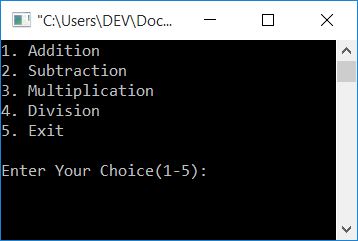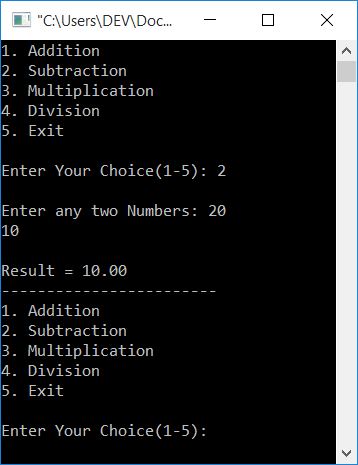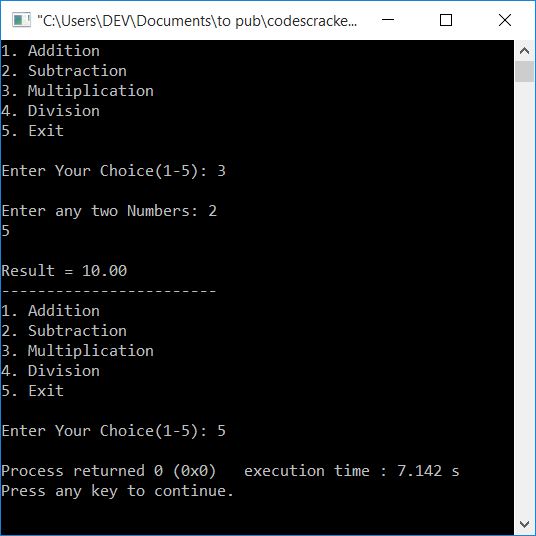- C Programming Examples
- C Programming Examples
- C Print Hello World
- C Get Input from User
- C Print Integer
- C Add Two Numbers
- C Add Subtract Multiply Divide
- C Add n Numbers
- C Area Perimeter of Square
- C Area Perimeter of Rectangle
- C Area Circum of Circle
- C Fahrenheit to Celsius
- C Celsius to Fahrenheit
- C Inches to Centimeters
- C Kilogram to Gram
- C Reverse a Number
- C Swap Two Numbers
- C Interchange Numbers
- C Print ASCII Value
- C Print Fibonacci Series
- C Check Palindrome or Not
- C Check Armstrong or Not
- C Find Armstrong Numbers
- C Find nCr and nPr
- C Find Profit Loss
- C Sum of their Square
- C First & Last Digit Sum
- C Sum of All Digit
- C Product of All Digit
- C Print Total Digit in Number
- C Check Perfect Number
- C Find Basic Gross Salary
- C Round Number to Integer
- C Print Series upto n Term
- C Find Factors of Number
- C if-else & Loop Programs
- C Check Even or Odd
- C Check Prime or Not
- C Check Alphabet or Not
- C Check Vowel or Not
- C Check Leap Year or Not
- C Is Reverse Equal Original
- C Make Calculator
- C Add Digits of Number
- Count Positive Negative Zero
- C Largest of Two Numbers
- C Largest of Three Numbers
- C Smallest of Two Numbers
- C Smallest of Three Numbers
- C Find Factorial of Number
- C Find LCM & HCF
- C Find LCM of n Numbers
- C Find HCF of n Numbers
- C Find Arithmetic Mean
- C Find Average, Percentage
- C Find Student Grade
- C Print Table of Number
- C Print Prime Numbers
- C Find Discount Purchase
- C Calculate Parcel Charge
- C Calculate Wage of Labor
- C Print Phone Bill
- C Conversion programs
- C Decimal to Binary
- C Decimal to Octal
- C Decimal to Hexadecimal
- C Binary to Decimal
- C Binary to Octal
- C Binary to Hexadecimal
- C Octal to Decimal
- C Octal to Binary
- C Octal to Hexadecimal
- C Hexadecimal to Decimal
- C Hexadecimal to Binary
- C Hexadecimal to Octal
- C Pattern Programs
- C Pattern Printing Programs
- C Print Diamond Pattern
- C Print Floyd's Triangle
- C Print Pascal's Triangle
- C Array Programs
- C 1D Array Programs
- C Linear Search
- C Binary Search
- C Largest Element in Array
- C Smallest Element in Array
- C Second Largest/Smallest
- C Count Even Odd
- C Array Element at Even
- C Array Element at Odd
- C Print Even Array Elements
- C Print Odd Array Elements
- C Sum/Product of Even/Odd
- C Reverse an Array
- C Insert Element in Array
- C Delete Element from Array
- C Merge Two Arrays
- C Bubble Sort
- C Selection Sort
- C Insertion Sort
- C Print Common Elements
- C 2D Array Programs
- C Add Two Matrices
- C Subtract Two Matrices
- C Transpose a Matrix
- C Multiply Two Matrices
- C Sum All Matrix Elements
- C Largest Element in Matrix
- C Print Row Column Total
- C 3D Array Programs
- C String Programs
- C Print String
- C Find Length of String
- C Compare Two String
- C Copy a String
- C Concatenate String
- C Reverse a String
- C Count Vowels Consonants
- C Replace Vowel in String
- C Delete Vowels from String
- C Delete Word from String
- C Frequency of Character
- C Count Word in String
- C Remove Spaces from String
- C Sort a String
- C Sort String in Alphabetical
- C Sort Words in Ascending
- C Sort Words in Descending
- C Uppercase to Lowercase
- C Lowercase to Uppercase
- C Swap Two Strings
- C Check Anagram or Not
- C Check Palindrome String
- C Print Number in Words
- C Print Successive Character
- C Character without Space
- C File Programs
- C Read a File
- C Write Content to File
- C Read & Display File
- C Copy a File
- C Merge Two Files
- C Reverse File
- C Count All Character in File
- C List Files in Directory
- C Encrypt & Decrypt a File
- C Delete a File
- C Misc Programs
- Generate Random Numbers
- C Print Date Time
- C Print Message with Time
- C Get IP Address
- C Print Smiling face
- C Pass Array to Function
- Add Two Numbers using Pointer
- C Address of Variable
- C Shutdown Computer
- C Programming Tutorial
- C Tutorial
C Program to Make a Simple Calculator
In this article, you will learn about creating a simple calculator program in C. A simple calculator is a calculator that performs four basic mathematical operations such as addition, subtraction, multiplication, and division. Here, the calculator program is created in two ways:
- Calculator program using the switch case
- Calculator program using the switch case and a user-defined function
In C programming, to make a simple calculator that can do the four most basic math operations, use the switch case to figure out which input operator to use for each calculation, as shown in the program below.
C Calculator Program with Switch Case
Here is a simple menu-driven program based on simple calculations like addition, subtraction, multiplication, and division according to the user's choice:
#include<stdio.h> #include<conio.h> int main() { float num1, num2, res; int choice; do { printf("1. Addition\n"); printf("2. Subtraction\n"); printf("3. Multiplication\n"); printf("4. Division\n"); printf("5. Exit\n\n"); printf("Enter Your Choice(1-5): "); scanf("%d", &choice); if(choice>=1 && choice<=4) { printf("\nEnter any two Numbers: "); scanf("%f %f", &num1, &num2); } switch(choice) { case 1: res = num1+num2; printf("\nResult = %0.2f", res); break; case 2: res = num1-num2; printf("\nResult = %0.2f", res); break; case 3: res = num1*num2; printf("\nResult = %0.2f", res); break; case 4: res = num1/num2; printf("\nResult = %0.2f", res); break; case 5: return 0; default: printf("\nWrong Choice!"); break; } printf("\n------------------------\n"); }while(choice!=5); getch(); return 0; }
This program was built and runs in the Code::Blocks IDE. Here is the initial snapshot of the sample run:

Now supply any input (as a choice from 1 to 5) in a way that:
- For Addition, enter 1.
- Enter 2 for subtraction.
- Enter 3 for multiplication.
- Enter 4 for Division.
- and enter 5 to exit.
Let's suppose the user enters 2 as his/her choice, so the program will ask again to enter any two numbers to perform the subtraction. For instance, if the user enters 2 as a choice and 20 as the first number, followed by 10 as the second number. Press the ENTER key to see the output as shown in the snapshot given below:

Press 5 to exit the calculation process. Let's take a look at the explanation of this program.
Program Explained
- Because a do-while loop executes its statement first, it checks the condition (at the end of the loop's body) after running all the statements placed inside the block of this loop.
- So, program flow enters into the do body, and all five menus get printed automatically.
- And then the program asks the user to enter his or her choice from 1 to 5.
- Let's suppose if the user enters 2 as input, 2 gets initialized to the choice variable.
- Because the value of choice is greater than or equal to 1 and less than or equal to 4,
- So program flow goes inside the if block and scans two numbers from the user.
- Let's suppose the user enters two numbers, say 20 and 10.
- Now, using the switch case, program flow goes inside its block and creates all 5 cases with their corresponding operations, that is, from addition to exit.
- Because the user enters 2 as input, case 2's statement gets executed.
- As a result, num1-num2 or 20-10 or 10 is assigned to the res variable.
- And the value of res gets printed as output, which is the subtraction result of the two given numbers.
- Then use the break statement to go to the condition part of the do-while loop and check whether the value of choice is not equal to 5 or not.
- If it is not equal to 5, then program flow again goes back to the start of the "do-while" loop's body.
- Otherwise, if it is equal to 5, then program flow exits from the do-while loop.
- Do the operation until the user enters 5 as his or her choice.
Create a simple calculator using a C function
After understanding the above program, it is easy to create the same program using functions. So here is the calculator program that uses functions in C.
#include<stdio.h> #include<conio.h> float addFun(float, float); float subFun(float, float); float mulFun(float, float); float divFun(float, float); int main() { float num1, num2, res; int choice; do { printf("1. Addition\n"); printf("2. Subtraction\n"); printf("3. Multiplication\n"); printf("4. Division\n"); printf("5. Exit\n\n"); printf("Enter Your Choice(1-5): "); scanf("%d", &choice); if(choice>=1 && choice<=4) { printf("\nEnter any two Numbers: "); scanf("%f %f", &num1, &num2); } switch(choice) { case 1: res = addFun(num1, num2); printf("\nResult = %0.2f", res); break; case 2: res = subFun(num1, num2); printf("\nResult = %0.2f", res); break; case 3: res = mulFun(num1, num2); printf("\nResult = %0.2f", res); break; case 4: res = divFun(num1, num2); printf("\nResult = %0.2f", res); break; case 5: return 0; default: printf("\nWrong Choice!"); break; } printf("\n------------------------\n"); }while(choice!=5); getch(); return 0; } float addFun(float a, float b) { return (a+b); } float subFun(float a, float b) { return (a-b); } float mulFun(float a, float b) { return (a*b); } float divFun(float a, float b) { return (a/b); }
Here is a sample run of the above program:

All four functions in this example accept two floating-point values as arguments, perform the operation, and then return the result to the main() function. That is, its return value gets initialized to the res variable.
The same program in different languages
« Previous Program Next Program »